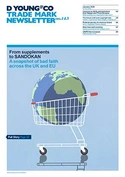Dry January: is the sobriety slogan too generic for trade mark protection?
In a recent decision from the UK Intellectual Property Office (UKIPO), Big Drop Brewing Company Limited opposed the trade mark application for DRY JANUARY by applicant Alcohol Research.
Background
Alcohol Research UK, a recognised charity promoting alcohol awareness, sought to register DRY JANUARY across various classes for goods and services concerning non-alcoholic products and associated promotional activities. Big Drop Brewing Company, a producer of non-alcoholic beverages, raised multiple (absolute) grounds for opposition under Section 3 of the Trade Marks Act 1994, namely, that the application was descriptive and non-distinctive, and made in bad faith.
Key issues
Big Drop Brewing Company argued that the term “dry January” is commonly used in the trade to describe the abstention from alcoholic drinks in January, thereby failing to function as a trade mark. Furthermore, Big Drop Brewing Company contended that Alcohol Research UK had no genuine intention to use the mark across the specified goods, potentially blocking other traders from using the term descriptively.
Alcohol Research UK sought to demonstrate evidence of acquired distinctiveness through extensive use in campaigns and promotions directly associated with alcohol abstinence awareness. It argued that DRY JANUARY had become synonymous with its activities and was recognised by the public as such.
Analysis of the decision
The opposition under Section 3(1)(a) of the Trade Marks Act 1994, which concerns marks that cannot constitute a trade mark, was swiftly dismissed. The hearing officer clarified that ”dry January” as a term, is not inherently incapable of distinguishing any goods or services. Thus, the mere fact that a term can serve as a trade mark in any context is sufficient to overcome an objection under this ground.
However, the opposition fared differently under Section 3(1)(b) of the Trade Marks Act 1994, which concerns signs that are devoid of any distinctive character. The hearing officer determined that DRY JANUARY is on the face of it objectionable, as it directly describes a period of abstaining from alcohol in January: a concept widely recognised and practiced. The use of these words on alcoholic beverages and related services would unlikely be perceived as a trade mark by the average consumer.
Similarly, turning to Section 3(1)(c) of the Trade Marks Act 1994, it was held the term “dry January” was already used by various entities in a non-distinctive manner by the relevant date. The hearing officer found the term was employed to describe the characteristics of products or services related to alcohol abstinence during January. This finding underscores the critical element of how a trade mark is perceived in the marketplace and its association with the goods or services it purports to cover.
Section 3(1)(d) of the Trade Marks Act 1994 addresses the customary nature of the sign in the current language or established practices of trade. The hearing officer pointed out that the use of #dryjanuary as hashtags on social media platforms like Instagram, among other descriptive tags, does not confer distinctiveness. The decision illustrates the difficulty in establishing trade mark rights in tags commonly used for social media campaigns, especially when lacking substantial evidence of distinctive use that links directly back to a single source or entity.
Section 3(6) of the Trade Marks Act 1994 concerns the registration of a trade mark made in bad faith. The hearing officer concluded that the trade mark application by the charity, which had been using the name for years to expand its scope of activities, was not made in bad faith. Its reasoning hinged on the broader context of the trade mark’s use and the intentions behind its registration, underscoring that filing a trade mark application, even one facing absolute grounds for refusal, does not automatically equate to bad faith.
Conclusion
Ultimately, the hearing officer ruled that DRY JANUARY could not function as a trade mark due to its descriptive nature and the public’s strong association of the term with a general concept rather than any specific trading source. As such, the opposition was successful.
In short
This decision serves as a reminder of the challenges of obtaining trade mark protection for phrases or sayings that are, or have evolved into, common usage. It also emphasises the necessity of presenting strong evidence of distinctiveness, and the pitfalls of attempting to trade mark terms that have become generic descriptors in the industry or broader society.
For trade mark practitioners this case is a reminder of the delicate balance between protecting commercial interests and preventing the monopolisation of descriptive language, as well as the importance of assessing the current and historical public usage of a term.
Case details at a glance
Jurisdiction: United Kingdom
Decision level: UKIPO
Parties: Big Drop Brewing Company Limited v Alcohol Research UK
Citation: O/0131/24
Date: 20 February 2024
